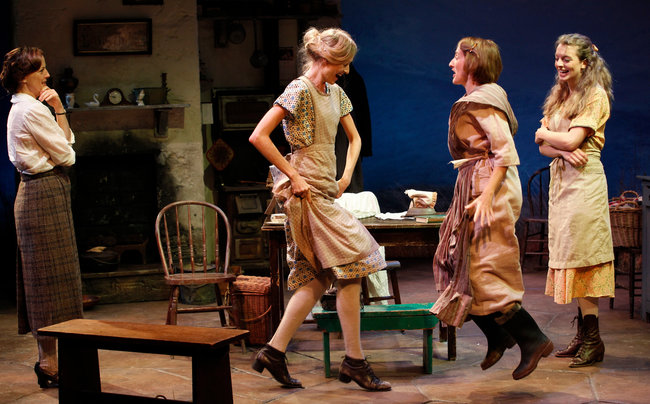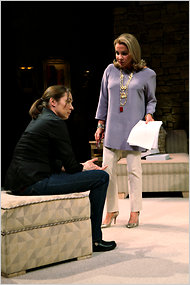In today’s Wall Street Journal drama column I report enthusiastically on two New York openings, the Irish Repertory Theatre’s revival of Dancing at Lughnasa and the Broadway transfer of Lincoln Center Theater’s production of Other Desert Cities. Here’s an excerpt.
* * *
 In this country, Brian Friel’s name is known only to frequent playgoers, and those who don’t follow theater closely will likely be unaware that he is one of the world’s foremost living writers. Yet if I were to draw up a list of the half-dozen best English-language plays of the postwar era, one of them would definitely be by Mr. Friel, and that one would almost certainly be “Dancing at Lughnasa.” First performed in this country in 1991, “Dancing at Lughnasa” is a tragedy disguised as a comedy, a tender yet unsparingly truthful tale of how the coming of modernity wreaks havoc on a close-knit Irish family during two warm summer days in 1936. It is a timeless work of genius, unmistakably influenced by Chekhov (and also, I suspect, by “Our Town” and “The Glass Menagerie”) yet at least as good as anything the Russian master ever wrote, and the Irish Repertory Theatre has given it a revival that is worthy in every conceivable way.
In this country, Brian Friel’s name is known only to frequent playgoers, and those who don’t follow theater closely will likely be unaware that he is one of the world’s foremost living writers. Yet if I were to draw up a list of the half-dozen best English-language plays of the postwar era, one of them would definitely be by Mr. Friel, and that one would almost certainly be “Dancing at Lughnasa.” First performed in this country in 1991, “Dancing at Lughnasa” is a tragedy disguised as a comedy, a tender yet unsparingly truthful tale of how the coming of modernity wreaks havoc on a close-knit Irish family during two warm summer days in 1936. It is a timeless work of genius, unmistakably influenced by Chekhov (and also, I suspect, by “Our Town” and “The Glass Menagerie”) yet at least as good as anything the Russian master ever wrote, and the Irish Repertory Theatre has given it a revival that is worthy in every conceivable way.
Part of the beauty of “Dancing at Lughnasa” lies in the way in which Mr. Friel uses the smallest and most intensely local of cultures, that of rural Ireland, as a stage on which the wrenching story of worldwide change is played out. The Mundys would seem at first glance to be as far removed from contemporary Europe as it is possible to get. But just as their battery-powered radio brings them brief, ecstasy-making glimpses of the unknown world beyond their narrow borders, so does the coming of a footloose, ne’er-do-well Welshman (Kevin Collins) thrust them abruptly into the fast-flowing stream of 20th-century life. All at once Ballybeg, the tiny Irish village where most of Mr. Friel’s plays are set, is invaded by sex, war and ambition, the three horses of the modern apocalypse…
Charlotte Moore, the director, whose Irish Rep revival of Mr. Friel’s “Molly Sweeney” recently had an equally successful run at New Haven’s Long Wharf Theatre, has worked her usual miracle with the awkward yet oddly comfortable L-shaped space in which New York’s best off-Broadway company performs. The small world of Ballybeg fits neatly onto the Irish Rep’s teabag-sized stage, and Ms. Moore’s cast, well led by Orlagh Cassidy and featuring an especially striking performance by Aedín Moloney, is so evenly matched that you might almost think the actors were blood relatives….
 Jon Robin Baitz’s “Other Desert Cities,” which had a very successful run at Lincoln Center Theater last winter, has now transferred to Broadway, where it will surely do as least as well–and deservedly so. Though not without flaw, Mr. Baitz’s latest play, a group portrait of a Reaganesque show-business family whose members are keeping secrets from one another, is for the most part both soundly made and emotionally persuasive, and Stockard Channing, Rachel Griffiths, Stacy Keach, Judith Light and Thomas Sadoski are as good as a cast as anyone could hope for.
Jon Robin Baitz’s “Other Desert Cities,” which had a very successful run at Lincoln Center Theater last winter, has now transferred to Broadway, where it will surely do as least as well–and deservedly so. Though not without flaw, Mr. Baitz’s latest play, a group portrait of a Reaganesque show-business family whose members are keeping secrets from one another, is for the most part both soundly made and emotionally persuasive, and Stockard Channing, Rachel Griffiths, Stacy Keach, Judith Light and Thomas Sadoski are as good as a cast as anyone could hope for.
The high quality of “Other Desert Cities” may come as a surprise to those who saw Mr. Baitz’s “Chinese Friends,” a glib, hysterical dystopian fantasy about politics in postmodern America that couldn’t have been much dumber. “Other Desert Cities” is not without its own moments of slickness, both political (the Republicanism-as-pathology thread gets old fast) and theatrical (too much of the first act feels like one of Neil Simon’s joke-encrusted “serious” plays). But the second act, in which Mr. Baitz’s characters face up at last to the destructive consequences of their well-meant deceptions, packs a roundhouse punch…
* * *
Read the whole thing here.
Archives for November 4, 2011
TT: Almanac
“The possibility of venting or distilling friendly or unfriendly feelings through the medium of literary criticism is what makes that art such a skewy one.”
Vladimir Nabokov, interview with Alvin Toffler (Playboy, January 1964)
